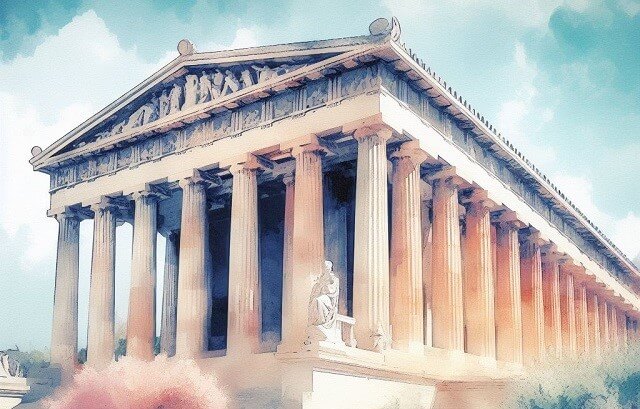
After the Flood, Noah blessed his son Yefeth:
“May God expand Yefeth, and may he dwell in the tents of Shem.” (Gen. 9:27)
What does this blessing mean? Why should Yefeth live in Shem’s tents?
The Sages noted that Yefeth was the ancestor of ancient Greece. As such, Yefeth’s blessing relates to the special accomplishments of the Greeks, especially in the realm of the arts and aesthetics (the name 'Yefeth' is related to the Hebrew word yofi, meaning ‘beauty'). As the Talmud states in Megillah 9b: “May the beauty of Yefeth reside in the tents of Shem.”
The blessing links Yefeth and Shem together through the cultures of their descendants, Greece and Israel. Yet the relationship between these two nations was never simple. We know from the story of Chanukah that these two civilizations clashed violently during the Second Temple period. How then can the beauty of Greek culture reside harmoniously in the tents of Israel?
Studying Greek Wisdom
On the one hand, the Sages placed no explicit prohibition against studying Greek philosophy. They were content to give general guidance, such as Rabbi Yishmael’s instruction to his nephew: “Find an hour that is neither day nor night, and study Greek wisdom at that time” (Menachot 99b).
Regarding the education of youth, however, the Sages were more circumspect. They feared that the outward appeal and beauty of Greek wisdom would lure the next generation away from their fathers’ faith. Thus they forcefully declared: “Cursed be the one who teaches his son Greek wisdom” (Baba Kama 82b).
The language of this decree specifically forbids teaching Greek wisdom. In other words, it is permitted to study it, but not to teach it. Young students must first acquire a solid basis in Torah, and only then will they be able to discern the difference between the Torah of Israel and the philosophy of Greece.
Style versus Content
We find that the Talmud makes a second distinction regarding Greek culture. “Greek language is one thing, but Greek wisdom is another” (Baba Kama 83a). The intent of this statement is to differentiate between style and content.
Greek wisdom, as a philosophy and an outlook on life, profoundly detracts from the sacred and defiles the holy. The Greek language, on the other hand, poses no challenge of ideas and beliefs. Greek is a rich and sophisticated language, and is an appropriate vehicle through which to express our thoughts and ideas. The external language does not influence or harm the inner content.
We have no need to borrow from the content of foreign cultures when our own traditions are so rich and stimulating, ennobling both the individual and society as a whole. But we may adopt from other peoples that which adds external beauty and elegance. Even after the culture clash with Hellenism, the Sages still taught that it is fitting to adopt stylistic enhancements — “May the beauty of Yefeth reside in the tents of Shem.”
This approach is not limited to ancient Greece, but is true for all foreign cultures. It is not inappropriate for us to utilize the innovations and talents of other nations. After all, the focus of the Jewish people is primarily on inner matters, on ethical and spiritual advancement.
Even for the construction of the holy Temple, we find that King Solomon turned to Hiram, the king of Tyre, for his workers’ expertise in cutting down and preparing the wood, “for we have none among us who knows how to hew timber like the Zidonians” (I Kings 5:20). Solomon used artisans from other nations to chop the wood and quarry the large stones for the Temple. But after these external preparations, it was the Jewish people who secured the Sanctuary’s inner holiness.
(Sapphire from the Land of Israel. Adapted from Mo'adei HaRe’iyah, pp. 182-184.)





